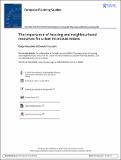Files in this item
The importance of housing and neighbourhood resources for urban microbusinesses
Item metadata
| dc.contributor.author | Reuschke, Darja | |
| dc.contributor.author | Houston, Donald | |
| dc.date.accessioned | 2016-05-05T15:30:03Z | |
| dc.date.available | 2016-05-05T15:30:03Z | |
| dc.date.issued | 2016 | |
| dc.identifier | 241569023 | |
| dc.identifier | bb4efda0-8c0e-4e77-8159-5303119249de | |
| dc.identifier | 84963830294 | |
| dc.identifier | 000376998200011 | |
| dc.identifier.citation | Reuschke , D & Houston , D 2016 , ' The importance of housing and neighbourhood resources for urban microbusinesses ' , European Planning Studies , vol. 24 , no. 6 , pp. 1216-1235 . https://doi.org/10.1080/09654313.2016.1168364 | en |
| dc.identifier.issn | 0965-4313 | |
| dc.identifier.uri | https://hdl.handle.net/10023/8730 | |
| dc.description.abstract | Economic research has rarely considered the significance of the home and neighbourhood context of where business owners’ live for their business. Conversely, urban and neighbourhood research has overlooked how housing and neighbourhood shape business and entrepreneurship outcomes. This paper investigates the importance of housing and neighbourhood resources for microbusinesses using a random sample of microbusinesses in Edinburgh (UK) including those that are informal and home-based, and various characteristics of the neighbourhood in which the business owner lives were attached to the survey records. The data capture whether business owners have business premises outside their homes, have used neighbourhood contacts, housing equity or space in the house for their business. In short, housing and neighbourhood resources are used by a large majority (82%) of microbusinesses. The findings challenge a number of common assumptions on the separation of commercial and residential functions, how neighbourhoods feature in the evolution of businesses, the nested conceptualisation of home within a neighbourhood and on the nature of home-based businesses. It is concluded that multi-use (rather than mixed-use) neighbourhood planning would help foster more flexible and dynamic use of neighbourhoods and urban districts, although recognising that this is a political issue. | |
| dc.format.extent | 20 | |
| dc.format.extent | 1795092 | |
| dc.language.iso | eng | |
| dc.relation.ispartof | European Planning Studies | en |
| dc.subject | Home-based business | en |
| dc.subject | Informal businesses | en |
| dc.subject | Microbusinesses | en |
| dc.subject | Neighbourhoods | en |
| dc.subject | Housing | en |
| dc.subject | Home | en |
| dc.subject | H Social Sciences | en |
| dc.subject | HF Commerce | en |
| dc.subject | NDAS | en |
| dc.subject | SDG 11 - Sustainable Cities and Communities | en |
| dc.subject.lcc | H | en |
| dc.subject.lcc | HF | en |
| dc.title | The importance of housing and neighbourhood resources for urban microbusinesses | en |
| dc.type | Journal article | en |
| dc.contributor.sponsor | European Research Council | en |
| dc.contributor.institution | University of St Andrews. Geography & Sustainable Development | en |
| dc.identifier.doi | https://doi.org/10.1080/09654313.2016.1168364 | |
| dc.description.status | Peer reviewed | en |
| dc.identifier.grantnumber | 639403 | en |
This item appears in the following Collection(s)
Items in the St Andrews Research Repository are protected by copyright, with all rights reserved, unless otherwise indicated.

